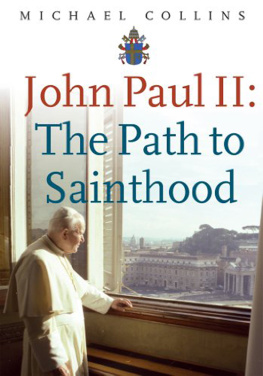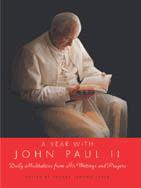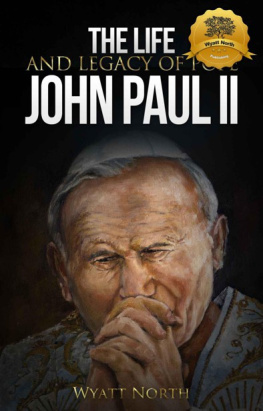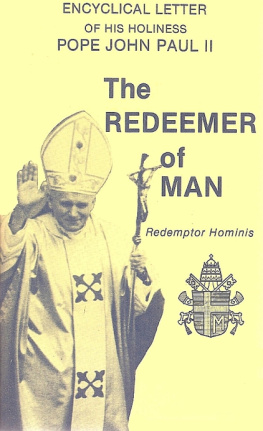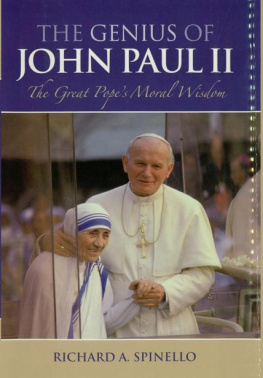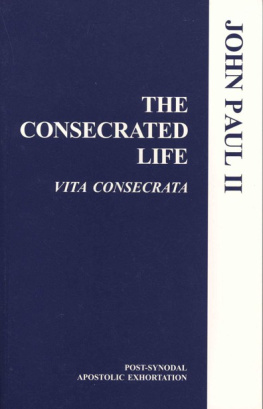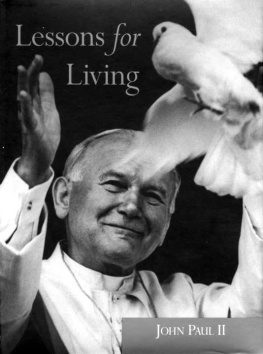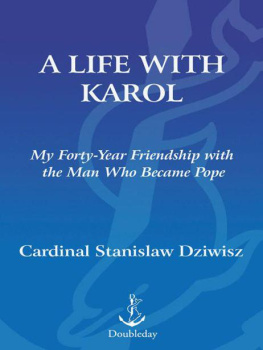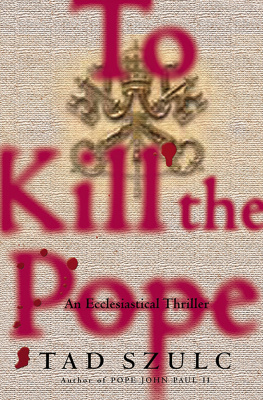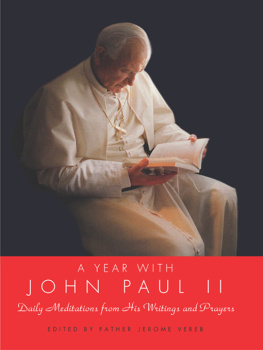See what a man can do
when with his spirit he rises like a star...
over the dark veil of the world.
Juliusz Sowacki
Discovering the Human Person
In Conversation with John Paul II
Stanisaw Grygiel
Translated by
Michelle K. Borras
William B. Eerdmans Publishing Company
Grand Rapids, Michigan / Cambridge, U.K.
2014 Stanisaw Grygiel
All rights reserved
Published 2014 by
Wm. B. Eerdmans Publishing Co.
2140 Oak Industrial Drive N.E., Grand Rapids, Michigan 49505 /
P.O. Box 163, Cambridge CB3 9PU U.K.
www.eerdmans.com
Printed in the United States of America
Library of Congress Cataloging-in-Publication Data
Grygiel, Stanisaw.
Discovering the human person: in conversation with John Paul II /
Stanisaw Grygiel; translated by Michelle K. Borras.
pages cm
Expanded version of the Michael J. McGivney lectures
delivered from March 18 to 21, 2013
at the
John Paul II Institute for Studies on Marriage and Family,
Catholic University of America, Washington, D.C.
ISBN 978-0-8028-7154-1 (pbk.: alk. paper)
1. John Paul II, Pope, 1920-2005.
2. Theological anthropology Catholic Church.
3. Catholic Church Doctrines. I. Title.
BT701.3.G7913 2014
233 dc23
2014013048
Humanum is an imprint of the John Paul II Institute for Studies on Marriage
and Family at the Catholic University of America in Washington, D.C.
Contents
It is a commonplace today to think of the John Paul II Generation as those young men and women who may have participated in a World Youth Day event or have been strongly influenced by the papacy of John Paul II, and who are now entering their professional careers and vocations to religious life or to marriage and family. But the reality is that the John Paul II Generation began many years earlier and far from the worlds attention with another generation of young adults who gathered around Bishop Karol Wojtya. This was a generation that listened to him speaking from the pulpit and in the classroom, that shared Sunday-afternoon dinners with him, that walked with him in the forests and in the mountains. He prepared these young adults for marriage, baptized their children, gave them spiritual guidance, and during times of sickness and tragedy offered them consolation. This was a generation that went with him on pilgrimage to places like the Marian shrine at Ludmierz and stood with him to erect a cross in defiance of communist oppression in the new churchless city of Nowa Huta. In this truly extraordinary book, Stanisaw Grygiel opens for us a window into the man who inspired this generation, the man whom the world would come to know as Pope John Paul II.
Soon after his election as pope, John Paul II called Professor Grygiel to Rome to serve as one of the founding members of a new pontifical faculty that would be officially established at the Lateran University in 1981. Soon to be known as the John Paul II Institute for Studies on Marriage and Family, it would pioneer a new approach to global theological education. Sessions of the Institute would soon be established, first in Washington, D.C., and then in the years to come on virtually every continent, bringing together scholars from Europe, North and South America, Asia, Africa, and Australia to study the challenges confronting marriage and family from a uniquely global perspective. And yet the Institute, which has now been engaged in this study for over three decades, is unique in another way as well. It is a community of scholars devoted to the study of the human person in all of his dimensions but centered on a study of the person in that community that is the original cell of human society: marriage and the family. From the beginning of this work, Professor Grygiel has been one of its most profound guiding lights. The reasons for this are abundantly evident in the pages that follow an expanded version of the Fr. Michael McGivney Lectures given in 2013 at the Institutes Washington, D.C., session at the Catholic University of America.
We see here how, while surrounded by the dehumanizing pressures of communist totalitarianism, Karol Wojtya lived day in and day out a profound Christian personalism. In the midst of constant propaganda about creating a new collectivist, godless society, Karol Wojtya lived a communion of persons. Over the years, he would invite many others into this communion. In this way, he experienced an authentic freedom and developed what he would describe as an adequate understanding of the human person. As Grygiel makes evident in chapter 1, there is nothing abstract or artificial about Wojtyas view of the person. Karol Wojtya wrote his anthropology above all with his life. It is in relationships especially those open to the possibility of deep personal development that we are able to realize that we belong to one another and are obliged to care for one another. Thus for Wojtya, the communion of persons is a place of freedom and a place that exists for freedom. It is the place where the truth that makes us free (cf. John 8:32) is revealed. Decades later such an understanding of human solidarity in freedom would change the face of Europe, but its origin could be seen in the faces of those who gathered around Karol Wojtya years earlier.
Much has been written regarding Karol Wojtya the artist about his early experience as an actor in Krakows Rhapsodic Theater as well as his dedication as a poet and playwright. In chapter 2, Professor Grygiel takes us further by opening a window into Wojtyas artistic sensibility, revealing its profoundly spiritual nature and showing us how it shaped his philosophical and theological thought. In reading, we come to understand that for Wojtya, Every human being is called to make of himself a work of art on earth. We cannot help but think of Dostoevskys famous observation that beauty will save the world. For Wojtya, this beauty is inseparable from love. For the person, who is called to make of himself a work of art, this beauty is therefore also inseparable from freedom and conscience. Grygiel aptly concludes this chapter with a quote from Wojtyas poem Thinking My Country I Return to the Tree and its defense of conscience: History lays down events over the struggles of conscience. Victories throb inside this layer, and defeats. History does not cover them: it makes them stand out. Can history ever flow against the current of conscience?
As Grygiel suggests in chapter 3, this defense of conscience and of the vision of the human person as a work of art inevitably leads us to the Christian vocation to holiness and to the cross. This is central to Wojtyas understanding of the new evangelization, which requires true witnesses of faith. In our time, this true witness is called for especially regarding the defense of marriage and family. Nazism and communism showed Wojtya that in marriage and the family, a decisive battle was being fought for truth and for freedom a battle for the dignity of the human person. In chapter 4, Wojtyas concern for married life is seen as arising out of a vision of a communion of persons in the service of a culture of love. This culture is reflected first in the relationship of the married couple to each other and in their family life and then, from there, into society at large. The reader should thus not be surprised that in chapter 5 the implications of Wojtyas vision of the person, freedom, and communion lead us to understand that both a nation and its politics have an inherent spiritual dimension. Every political system, Grygiel writes, must allow itself to be formed by love. Here he makes clear that for John Paul II, the reference to the necessity of Christians working to build a civilization of love is not simply a pious catchphrase but a concrete proposal arising from a fundamental commandment of the Christian life to love ones neighbor as ones self.
Next page

